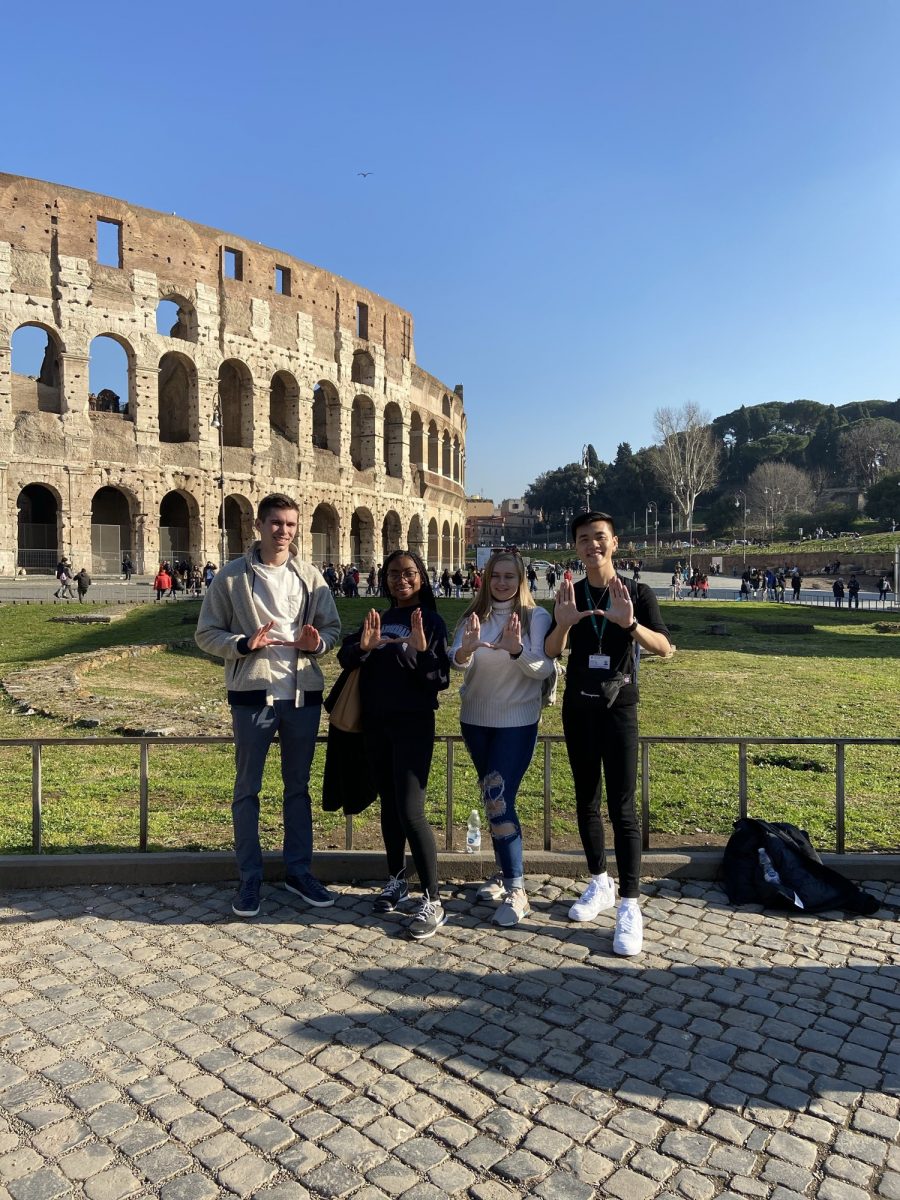
Ashley Rock was out in the streets of Paris with her fellow students when she received a mass email blast from the University of Miami at around 11:30 p.m. Friday Feb. 28, announcing that their study abroad program in Rome had been cancelled due to the coronavirus. All UM students studying at the American University of Rome as part of the URome program were due back in the United States by March 6, the email said.
This news came after Italy officially became a CDC COVID-19 Level 3 country, meaning that all nonessential travel to that country should be avoided.
Rock, a junior at UM majoring in marketing, said she and other UM students with her were crushed. Up until that point, she said she had not been worried at all about contracting the coronavirus as the real epicenter of the outbreak in Italy was in the northern region, far from Rome.
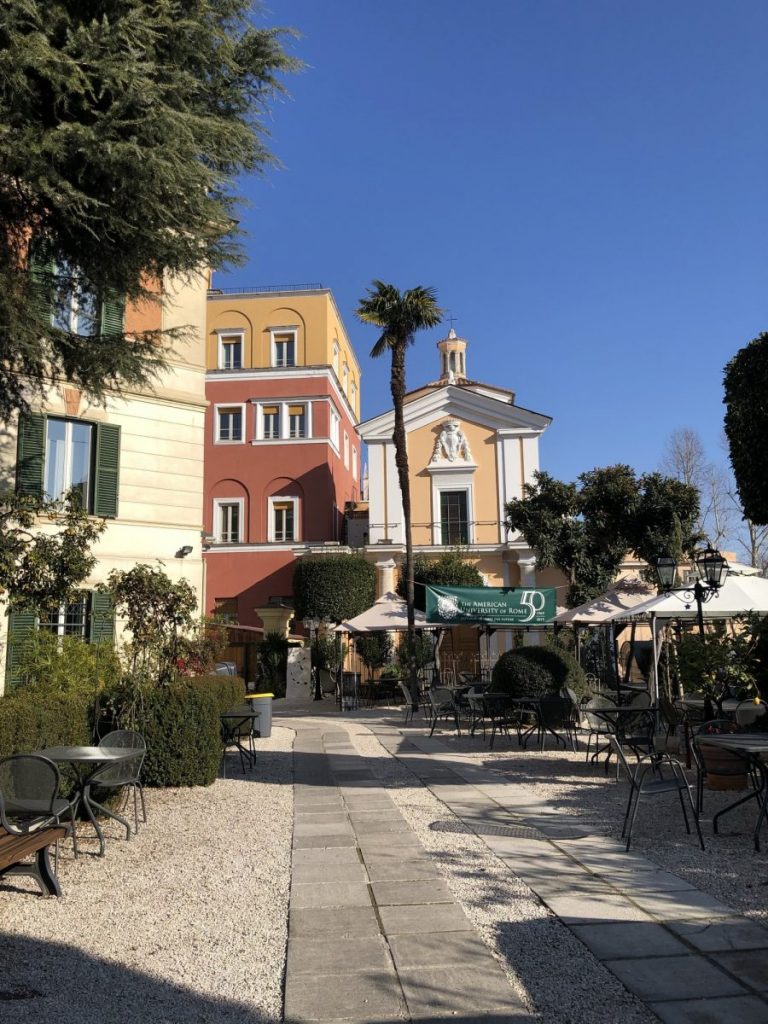
Similarly, Grace Harrington, another student in the URome program, was in her apartment in Rome watching a movie when she got the news that her trip would be cut short. No personal email was sent to the students studying abroad, and later the Office of Study Abroad subsequently sent an apology for the poor communication, said Harrington, a junior majoring in political science and religion. The Office of Study Abroad did not respond to requests from The Miami Hurricane to comment.
“We were stuck in a pandemic with no one to contact at the university. Imagine 25 students crying and calling parents, trying to figure out how they will go home, how to bring everything back so quickly, how we would finish classes, how we would get our money back,” Harrington said. After they received this email, Rock said she and other students reached out to the Office of Study Abroad several times but did not receive any responses for a few days.
In the same message sent on Feb. 28, the university announced that study abroad programs in China, Japan and South Korea set to start later this semester are also suspended.
The university is requiring all students traveling from China, France, Germany, Iran, Italy, Japan, South Korea and Spain to self-identify, contact UHealth and self-quarantine for 14 days at their homes before they will be allowed to return to UM’s campus.
At the time when the university terminated the program in Italy, there were no confirmed cases in Rome. However, as of Tuesday, March 12, Italy has the most coronavirus cases outside of China, with over 15,000, including several in Rome.
Italian Prime Minister Giuseppe Conte announced Monday that the entire nation would enter lockdown. This includes measures similar to those taken in China such as closing schools and public spaces, travel restrictions and banning public events among others. Famous sites such as the Roman Colosseum are no longer open to visitors for the time being.
Harrington said Rome had no cases until a few days before she left. Then, the tone of the city changed.
“The city felt panicked. There were no masks or hand sanitizers anywhere. The catacombs and museums were being shut down,” Harrington said.
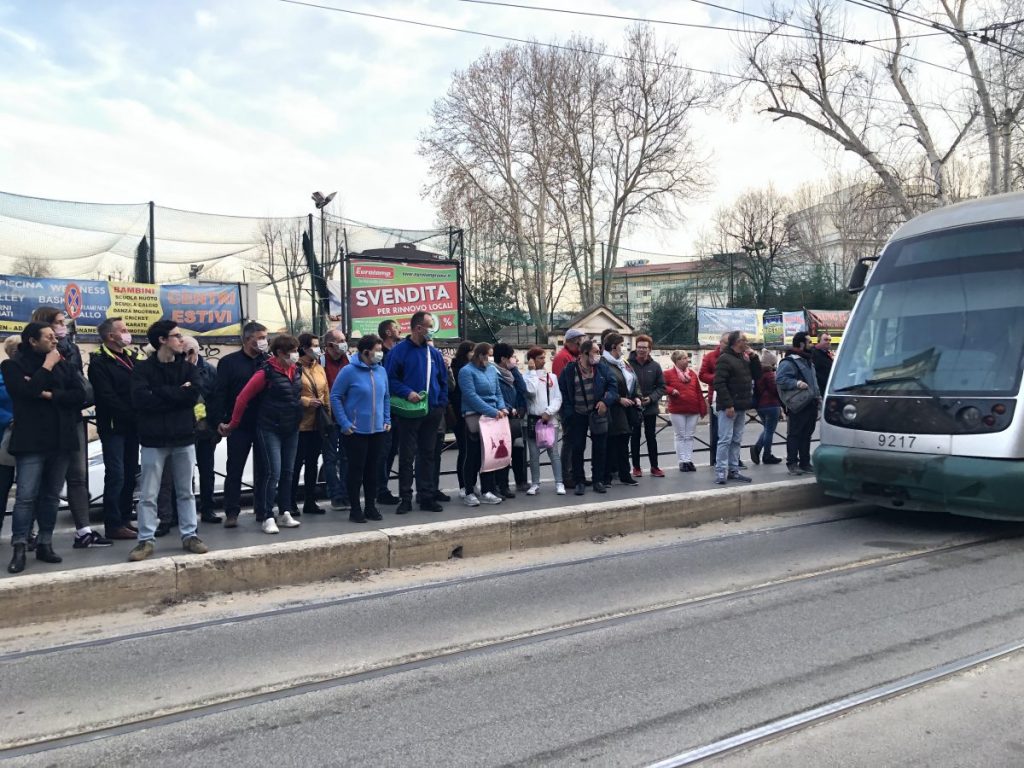
Despite this, Harrington added that she still felt relatively safe.
“Speaking on behalf of most of us [students], we would have rather taken our chances than go home at the time,” Harrington said. “Now that the cases are exponentially rising, it’s probably better to be home.”
The students were given a week to return back to their respective residences in the United States, and to help bring them home, the university provided $500 for a flight refund. However, this didn’t entirely cover the students’ travel, Rock said. Her flight back to Los Angeles cost her $1,000, leaving her out $500 from the unexpected travel.
Upon reentry into the United States, students coming back from Italy noted the lack of precautions taken at American airports.
“I was screened heavily in Italy for coronavirus. When I left Italy, I was thermal scanned, and I had to fill out paperwork. But when I came back to the U.S., they didn’t scan me, and the passport control just asked me where I was coming from,” said Harrington, who flew into Miami International Airport on March 5. “Basically, there was no security on the United States’ end.”
Tori Hoff, a UM student who was studying in Florence at Lorenzo De Medici Institute through an outside program called Academic Program International, had a similar experience.
“When I was traveling in Europe, whenever I returned to Florence, they would take my temperature before letting me leave the airport,” said Hoff, a junior majoring in public relations and media management. “When I got back to the United States, I did not have to be checked by the health authorities. All they asked was if I needed help with my bags.” Hoff arrived at Newark Liberty Airport on Jan. 26. Her parents decided to pull her from the program a few weeks before it was officially cancelled.
Gaby Horowitz, a junior at UM, was also studying in Florence with Toff through the same program, and she left Italy more than a month later on Feb. 28 after it was cancelled.
“We had already had tests and projects when we found out we were leaving, and midterms were less than two weeks away,” said Horowitz, an education major.
Also studying abroad in Florence through a non-UM program was Naomi Feinstein. The week after the Venice Carnival, Feinstein and her classmates were gathered for an emergency meeting and they were told that their program in Florence with Syracuse University had been suspended, and that they needed to leave Italy or risk being stuck and quarantined there.
“I was not worried about contracting the coronavirus, so it was definitely disappointing when they decided to cancel the program because at that point there was only one case in our region,” Feinstein said.”
While she had originally planned to fly back to New York City and then head to Miami, Feinstein and five of her friends decided to spend some time traveling Europe. After leaving Florence, Feinstein headed to London and then finished off her trip in Barcelona.
The university mandates that all students returning from CDC-designated Covid-19 Level 3 countries must be self-quarantined at their homes for 14 days. In doing so, they must remain in their house and avoid contact with others until they have exceeded the typical lifecycle of the novel coronavirus.
Harrington is currently in day eight of her self-quarantine at her home in Kendall, Florida. She said she hasn’t experienced any symptoms yet and is pretty confident that she does not have the coronavirus.
Her younger brother, a junior at TERRA Environmental Research Institute, is also being quarantined for two weeks, a decision made Monday, March 9 by Miami-Dade County Public Schools. However, her brother had already been in school both Friday and Monday following Harrington’s return from Rome on Thursday.
At her home in Southern California, Rock is self-quarantining as well, but she says she feels fine so far. After her 14 days are up, she plans to spend some time traveling across the United States. While she is sad that her trip got cancelled, she is trying to make the most of the rest of the semester.
“Yes, I’m bitter, but at the same time, I’m thankful UM had us go home when we did,” Rock said.

Both Hoff and Horowitz are back at their homes in New Jersey, where Horowitz is self-quarantining.They plan to return to Miami in the near future.
Now that they’re back, these students’ main concern is not the coronavirus but what is going to happen with the rest of the semester.
Feinstein begins online classes March 16 and Hoff and Horowitz will be doing distance learning with the Lorenzo De Medici Institute starting March 23.
“We still do not know exactly what the distance learning will entail,” said Horowitz. “I am concerned about my credits and my classes.”
Those who were studying abroad with URome will be completing online classes coordinated by the American University of Rome, also starting March 23, Rock said. One worry the students have is that not all of the classes can be adapted to an online format. Harrington explained that several of them took on-site classes that incorporated field trips into the curriculum, such as her archaeology class where they would spend time visiting museums or the colosseum.
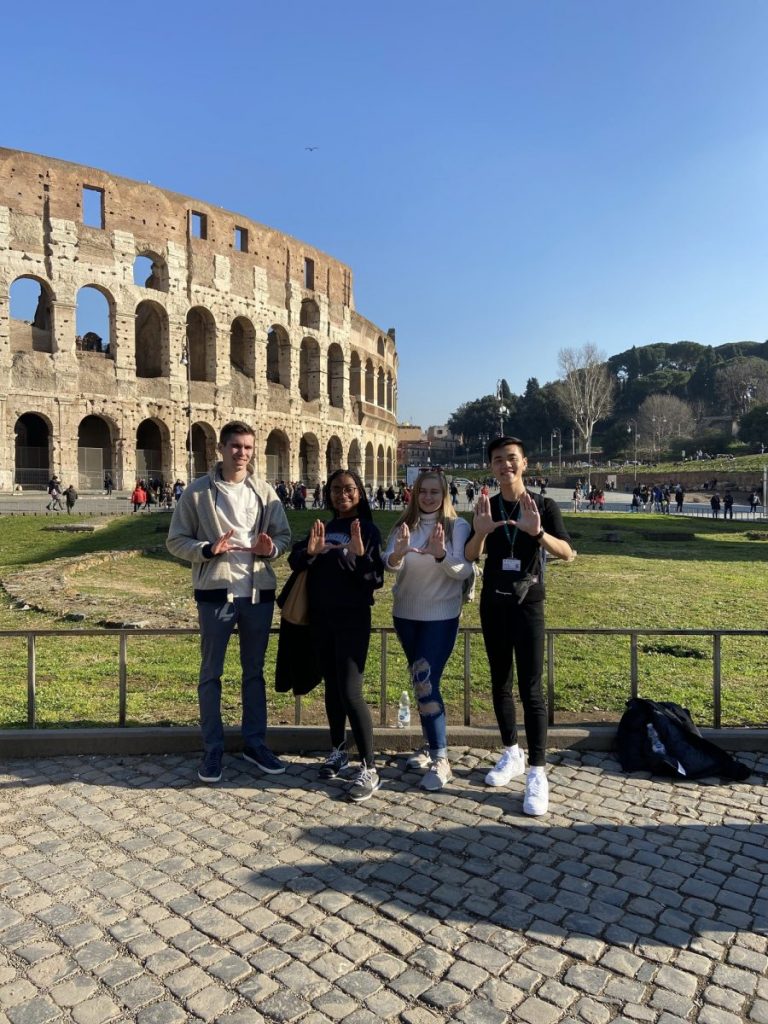
To compensate for classes such as these, the American University is providing an optional course covering Italian culture which should make up for any credits lost.
Harrington said she is concerned that it will be more difficult to do well in online courses, as compared to in-person instruction back in Rome.
“Taking Italian here is not the same as being able to practice in Italy,” Harrington said.
Students at UM will also begin distance learning starting March 23, until April 4. This decision came on March 12 after the first confirmed case of the coronavirus in Miami-Dade County was announced March 11 and WHO declared the coronavirus a global pandemic.
A bigger issue that URome students brought forward is compensation for the money they lost paying for study abroad, only to have their time cut short.
“We paid a $5,000 program fee on top of UM tuition. We paid for a semester of housing in Italy for an apartment that sits empty while I sit at home doing online work. It doesn’t make sense,” Harrington said.
Rock shared similar views.
“I wish the university would offer us some more refunds because I know many people who worked so hard and spent their savings on flights they never got to take. Miami can do more for us,” Rock said.
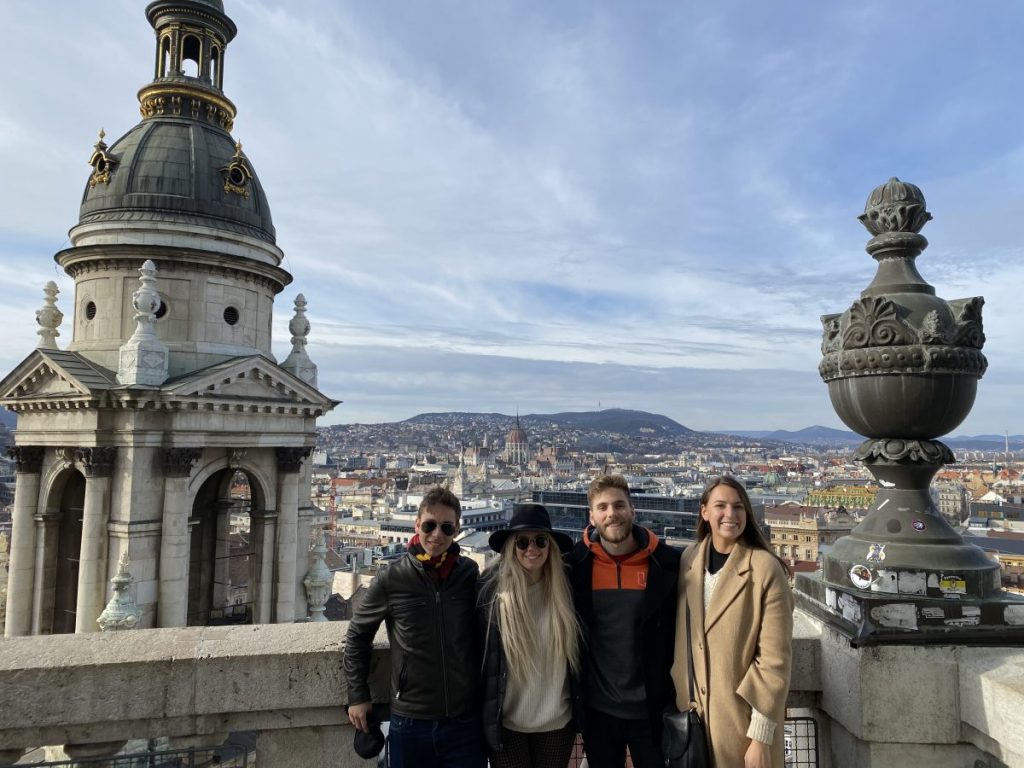
When Harrington emailed Erika Quinonez, the advisor at the Office of Study Abroad responsible for the URome trip, about getting a refund for school trips planned for Assisi, Bologna and Florence, she received a response outlining the procedures students should follow in making arrangements to fly home. Quinonez did not address any questions of a refund, but stated, “We know this is a stressful situation and we are doing our best to address concerns and come up with rapid solutions.” Quinonez did not respond for comment.
So far, the university has not released any information about a potential refund for program fees.
“I just hope the university tries to make up for this horrible experience. Study abroad was supposed to be the best time of my life, and it was stolen from me. But who could have known a pandemic would hit the country I was in?” Harrington said.
In Spain, where several other UM students are studying abroad, coronavirus cases have jumped past 1,000, and the Spanish government announced Monday, March 9 that it would close all schools and universities in Madrid effective Wednesday.
As of Tuesday, March 12, UM has now cancelled all study abroad programs in Europe, a decision made following the U.S. European travel ban.
A message sent out to students on March 5 stated, “The university continues to communicate directly with students impacted by potential changes to study a broad and other academic programs and will work to ensure their safe return to the United States, if needed.”
Kay Begg contributed to the reporting of this story.






